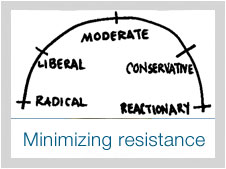What is the goal of THIS particular training session/presentation? It may be different or only a part of your over-arching goal, but try to focus on what you specifically want to accomplish at this meeting/training and how it fits in with the over-arching goal.
What is/are the key point/s participants should have when they walk out of the room? Then BE SURE TO TELL YOUR AUDIENCE! (Maybe you want them to walk out understanding the 10 seeds, maybe you want them to walk out asking themselves what could be done differently, etc.)

Likely training goals springing from the Vincentian Family Systemic Change Meeting:
- To educate people on the basic concepts of Systemic Change, and/or to share information about what the Vincentian Family is doing world-wide
- To provide a catalyst/opportunity for Vincentian Family members to think creatively about what types of systemic change projects could be started within their local community/service area
- To think critically about an existing ministry in light of the Systemic Change concepts and/or to work on effecting a change within the existing service model of a particular project

Tailoring the training to your audience
- Connect with what motivates people. Ask yourself: Why are people coming to this presentation/training? This will help you understand what will motivate people to “buy-in” to the ideas (sense of duty to the mission, love of social justice, desire to do something useful, desire to put faith in action, good place to build fellowship etc…) and you can emphasize these connections in the presentation by explaining why it’s important for “US” to engage in this.
- Simplify or Specify. Ask yourself: How likely are people to be familiar with these concepts? This will help keep you from giving too much specific detail and example where basic concepts are not yet firmly understood OR from boring people with more of the same foundational ideas when they are already prepared to take it to the next level.
- Anticipate and Answer. Ask yourself: What are the most likely objections, questions, concerns or challenges the participants will have? Try, where possible, to prepare some responses to questions or concerns that are likely to come up, even if it is just having additional referral resources handy (ex: “I don’t know what the liability for an alternative payday lending project would be in our county, but you could contact Pat Hogrebe* from SSVdP who has experience in this area.”) *presenter of “Banking for the Poor” breakout session.
BEFORE you present
Spend some time reflecting on how your political, cultural, personal (etc.) opinions impact the way you present information. Try to avoid multiple agendas and “loaded” language that may alienate participants or create unnecessary resistance. (Even if you are totally convinced that politician X is to blame for unjust policy Y that created problem Z: consider if THIS training is the best time to bring it up)

Making good use of your resources
- Equipment. Memorable and effective trainings depend less on what you have and more on what you do with it. Technology allows us to do some really cool stuff, but glitches can cause aggravation, interrupting the flow of training. People might not remember what you said, but they will remember how much trouble you had saying it. Stick with what you know, or get someone who knows to help. Allow ample time for equipment setup, and practice using the equipment in the room where training is to take place.
- Creativity. A simple index card with a key phrase (such as: “everything is connected to everything else”) can help you make your point clear. Doing just one thing beyond the standard lecture, handout, PowerPoint, Q&A can help generate interest and make it memorable.
- Time. Plan to fit your key points into the time you have.
- Integrate Available Online Resources. Consider asking participants to familiarize themselves with basic concepts using online tools such as the Concepts of Systemic Change Mini-Course, prior to coming to the training session. Download and make use of the Systemic Change Toolkit.
Shared by Sr. Salvatrice Murphy, DC








One Comment on “Tips & Suggestions for Systemic Change Trainers”
In some religious groups, some members like to challenge me when i talk about unity, peace, love, mercy and compassion for everyone whether good or bad by man’s measurement. I talk about God’s unconditional love for every one and equal worth for everyone – no special privilege, position or favoritism for anyone.
Therefore, i cannot sit around a conference table and pat myself on the back and say that our conference is number one and the others will be jealous because of the awards we are going to get. In God’s eyes all conferences are number one. I serve the Lord because i just have the plain love to do His will.